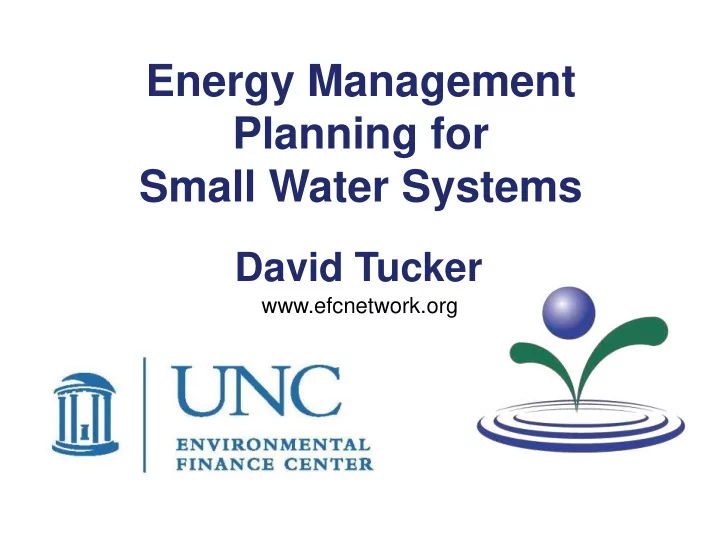

Energy Management Planning for Small Water Systems David Tucker www.efcnetwork.org
6/19/2013 Dedicated to enhancing the ability of governments and organizations to provide environmental programs and services in fair, effective, and financially sustainable ways www.efcnetwork.org
Smart Management for Small Water Systems 6/19/2013 Smart Management for Small Water Systems * under a Cooperative Agreement with the US EPA • The EFCN will provide training and technical assistance to small public water systems in all fifty states and five territories to help local water systems achieve and maintain compliance with the Safe Drinking Water Act. • Workshops and trainings will be provided in these areas: – Asset Management – Water Loss Reduction – Water System Collaboration – Fiscal Planning and Rate Setting – Energy Management – Funding Coordination, and – Managerial and Financial Leadership www.efcnetwork.org
Smart Management for Small Water Systems 6/19/2013 Acknowledgments • Wilson Community College • All of our expert speakers • My EFC colleagues • All of you for being here! www.efcnetwork.org
6/19/2013 Why are we here today? • Rising energy costs – EPA estimates that the cost of energy as a percent of operating costs for drinking water system can reach as high as 40 percent and is expected to increase 20 percent in the next 15 years. – N.C: Duke Energy Progress 7.5% rate increase (2013) – N.C: Duke Energy 7.2% rate increase (2012) • Energy management plans reduce costs! • Renewable energy possibilities Source: http://www.newsobserver.com/2013/05/30/2928331/nc-approves-75-percent-rate-increase.html www.efcnetwork.org
6/19/2013 Energy-Water Nexus • 2 trillion gallons of H 2 O: estimated amount pumped each year by small systems. • $1 billion: estimated electric power costs per year for these small systems. • $10 million: annual electric bill savings from a 1% reduction in electric costs. • $100 million: annual electric bill savings from a 10% reduction in electric costs. Source: Regnier and Winters, “Reducing electric power costs in small water systems,” Journal AWWA, April 2013, 67-72. www.efcnetwork.org
6/19/2013 Turning Point exercise www.efcnetwork.org
What is your role at your organization? A. Business Owner 32% B. Elected Official 28% C. Engineer D. Finance Officer 16% E. Water System Mgr. 12% 8% F. Other 4% Engineer Other Business Owner Elected Official Finance Officer Water System Mgr.
What was your area of study in school? A. Business 41% B. Engineering 33% C. Law D. Planning 19% E. Public Administration 7% F. Other 0% 0% Business Law Other Engineering Planning Public Administration
What is your level of experience with energy management? A. I know shockingly 63% much on electricity! B. Fairly powerful energy expert. C. Trying to stay current. 11% 11% 11% D. Feel some resistance 4% to the topic. E. Watt exactly is energy Trying to stay current. Feel some resistance to t.. I know shockingly much .. Fairly powerful energy e... Watt exactly is energy a... anyway?
Who is your electric power provider? A. Dominion North 74% Carolina Power B. Duke Energy / Duke Energy Progress C. EMC / Co-Op 13% 4% 4% 4% D. NCEMPA / NCMPA1 EMC / Co-Op Other NCEMPA / NCMPA1 Dominion North Carolin... Duke Energy / Duke Ene... E. Other
6/19/2013 Introductions • Name • Organization • Role at organization • One or two sentences about energy management at your utility www.efcnetwork.org
6/19/2013 Morning Agenda Start Time Topic 9:00 Welcome, Introductions, and Why We’re Here (D. Tucker) 9:30 Energy Management Planning and NYSERDA (M. Tiger) 10:00 Establishing a Baseline + Introduction to Portfolio Manager (L. Hoey) 10:30 Break 10:45 Energy Management Case Studies and Energy Audits (C. Meyer) 11:45 Break 12:00 Working Lunch Presentation: Performance Contracting for Energy Management Projects (F. Shepard and L. Hoey) www.efcnetwork.org
6/19/2013 Afternoon Agenda Start Time Topic 12:45 Understanding Electric Bills + Duke Energy’s Energy Efficiency Rebates and Incentives (M. McGowan) 1:30 Water Loss and Energy Management (R. Harris) 2:00 Break 2:15 Project Economics and Financing (M. Tiger) 3:00 Funding Panel Presentation (A. Paintal, S. Robertson, D. Delong) 4:00 Developing an Implementation Plan and Tracking Progress (D. Tucker) 4:30 Wrap-Up Session (D. Tucker and F. Stefan) 4:45 End Day www.efcnetwork.org
6/19/2013 Energy Management Post- Workshop Opportunities • Contact the EFC to request direct technical assistance under the Small Systems grant in developing your utility’s new energy management plan. • Contact our expert speakers / their organizations for help. • Get an energy audit. • We’ll contact you in a month to follow up! www.efcnetwork.org
Thank You David R. Tucker Project Director Environmental Finance Center School of Government, UNC-Chapel Hill drtucker@sog.unc.edu (919) 966-4199 http://efc.unc.edu
Recommend
More recommend